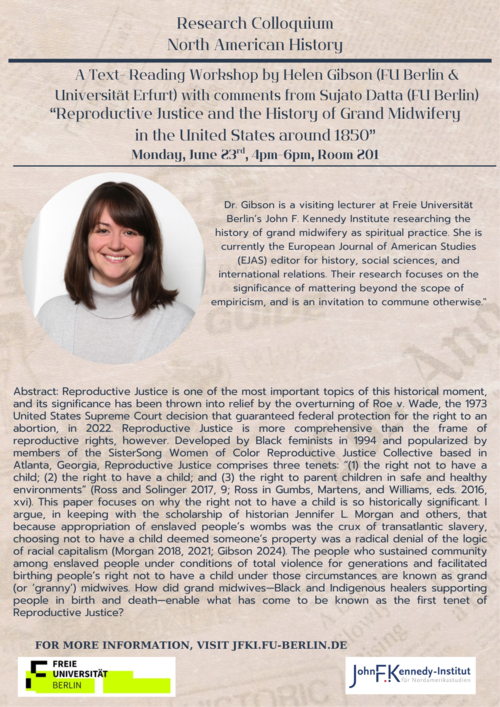Research Colloquium: Text Reading Workshop "Reproductive Justice and the History of Grand Midwifery in the United States around 1850" by Helen Gibson
Dr. Gibson is a visiting lecturer at Freie Universität Berlin’s John F. Kennedy Institute researching the history of grand midwifery as spiritual practice. She is currently the European Journal of American Studies (EJAS) editor for history, social sciences, and international relations. Their research focuses on the significance of mattering beyond the scope of empiricism, and is an invitation to commune otherwise.
Abstract: "Reproductive Justice is one of the most important topics of this historical moment, and its significance has been thrown into relief by the overturning of Roe v. Wade, the 1973 United States Supreme Court decision that guaranteed federal protection for the right to an abortion, in 2022. Reproductive Justice is more comprehensive than the frame of reproductive rights, however. Developed by Black feminists in 1994 and popularized by members of the SisterSong Women of Color Reproductive Justice Collective based in Atlanta, Georgia, Reproductive Justice comprises three tenets: “(1) the right not to have a child; (2) the right to have a child; and (3) the right to parent children in safe and healthy environments” (Ross and Solinger 2017, 9; Ross in Gumbs, Martens, and Williams, eds. 2016, xvi). This paper focuses on why the right not to have a child is so historically significant. I argue, in keeping with the scholarship of historian Jennifer L. Morgan and others, that because appropriation of enslaved people’s wombs was the crux of transatlantic slavery, choosing not to have a child deemed someone’s property was a radical denial of the logic of racial capitalism (Morgan 2018, 2021; Gibson 2024). The people who sustained community among enslaved people under conditions of total violence for generations and facilitated birthing people’s right not to have a child under those circumstances are known as grand (or ‘granny’) midwives. How did grand midwives—Black and Indigenous healers supporting people in birth and death—enable what has come to be known as the first tenet of Reproductive Justice?"

